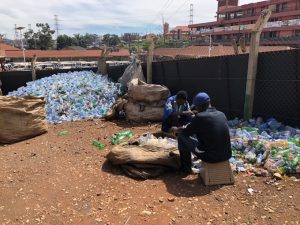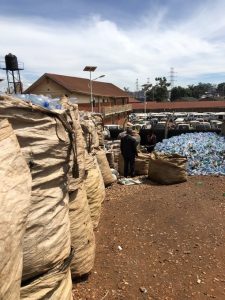The Korea International Cooperation Agency (KOICA) expressed its interest to financially support the “Strengthen Solid Waste and Feacal Sludge Management Capacity of the Greater Kampala Metropolitan Area” project as designed by the Global Green Growth Institute (GGGI), in partnership with the European Union and the Ministry of Water and Environment. The main goal of this project is to improve integrated planning for sustainable solid waste and fecal sludge management in the GKMA; enhance capacity for solid waste and fecal sludge management in the GKMA as means of attaining a green growth transition in Uganda’s cities.
In a bid to make an informed decision, GGGI hosted a team of experts from KOICA to undertake a basic design survey to validate the project concept and assess the feasibility of the project idea, partners, and stakeholders, as well as the impact of the proposed project. The mission was conducted from (Mon) 25 – (Fri) 29 November 2019.
The experts dispatched to undertake the study include; Professor Kim Jong Kyu, Department of Civil Engineering, Kyungnam University, Mr. Lee Jaehoon, Beomhan Engineering, and Mr. Ahn Heungky, Yoonshin Engineering Corporation.
At National Level, Uganda’s quest to attain the middle-income status of a per capita income of USD 9500 by 2040 is envisioned through the progressive implementation of the National Development Plans (NDPs). The country has set ambitions of a “Transformed Uganda Society from a Peasant to a Modern and Prosperous Country within 30 years.” This shall involve attaining an upper-middle-income status with a GDP per capita of USD 9500 by 2040.
Towards this ambition, Uganda has implemented two National Development Plans (NDP I and NDP II) and is in the process of developing the Third National Development Plan 202/21 – 2024/25 (NDP III) whose theme is “Sustainable Industrialization for Inclusive growth, employment, and Sustainable Wealth Creation”. Some of the anticipated development results of the NDP III include raising per capita income to USD 1100, reducing the poverty rate to 14.2, reducing income inequality to 0.38, and attaining a GDP growth rate of 8.3%. The NDP III has importantly taken a Programme based approach and consequently earmarked 16 Programme outcome actions.
Uganda in 2017 adopted the Uganda Green Growth Development Strategy 2017/18 – 2030/31 (UGGDS) as a mechanism for delivering the inclusive sustainable development and setting Uganda onto a green growth development pathway. The UGGDS emphasizes Uganda’s highest Green Growth potential areas as agriculture, natural capital management, green cities (urban development), transport, and energy. The implementation of the UGGDS is expected to deliver decent green jobs, enhance the country’s adaptation and mitigation of climate change effects, reduce greenhouse gas emissions even below the NDC targets, increase resource use efficiency and deliver inclusive social and economic transformation among others. The implementation of UGGDS is expected to be through the systematic implementation of green growth interventions through the National Development Plan framework with specific earmarked interventions planned through the phases of the subsequent NDPs leading up to 2030.
The National Planning Authority (NPA) is in the process of drafting the third NDP III. It has highlighted 16 Programme areas including Agro-industrialization for commercialization of agriculture; Agro-industrialization; mineral development; sustainable development of petroleum resources; tourism development; Climate change, natural resources, environment and water management; private sector development; integrated transport infrastructure and services; energy and ICT; sustainable housing and urban development; human capital development and social protection; innovation, technology development and transfer; governance and security; public sector transformation; regional development; and development plan implementation program.
The ambition of the NPA is to make this NDP green through three aspects namely, generating at least one green growth project in each of the 16 programs; articulating clear macro-level green growth financing mechanism/green finance flows for NDP III; and creation of green growth indicators to clearly monitor and evaluate program impact.



The Global Green Growth Institute (GGGI) has been supporting the NPA and other government partners in the green of Uganda’s policies and development programs as well as mobilizing resources for green growth implementation. In 2019 GGGI launched a Green Growth index which measured green growth efforts in 115 countries globally, Uganda inclusive. The Index allows governments to align their pathway to green growth while achieving SDG and National climate targets.
In addition, the NPA has undertaken a series of Expenditure reviews with the private sector, CSOs, DPs which in turn have uncovered opportunities and the need to scale up GG take within the country. The review involved two major aspects namely the identification of green growth expenditures followed by the analysis of the expenditures on the basis of the economy, efficiency and effectiveness. The NPA has continued to witness slow progress in terms of integrating the UGGDS into Sector Development Plans and Annual Workplans. This was demonstrated by the lack of deliberate and proper alignment of Green Growth projects to the Uganda Green Growth Development Strategy. This can be attributed to the fact that Green Growth Strategy was launched after several sectors had already finalized their Sector Development Plans.
Thus, now that the NDP III is under formulation, there is need to align with the planning cycle as an entry point to integrate deliberate green growth projects in the plan and Sector Development Plans to ease traceability and accountability on responsible centers in charge of the Uganda Green Growth Development Strategy priority areas.
GGGI hopes to seize the opportunity in collaboration with NPA to embed Green Growth aspirations of the UGGDS in the NDP III as well as develop key indicators and targets to support the transition. GGGI shall employ her track record in supporting green growth planning in developing countries and avail the green growth index and Uganda assessment report in the review process.
Thus, all interventions to be supported by our partners will be aligned to the UGGDS
About GGGI
Based in Seoul, GGGI is a new intergovernmental organization founded to support and promote a new model of economic growth known as “green growth.” The organization partners with countries to help them build economies that grow strongly and are more efficient and sustainable in the use of natural resources, less carbon-intensive, and more resilient to climate change. GGGI’s experts are already working with governments around the world, building their capacity and working collaboratively on green growth policies that can impact the lives of millions. To learn more, see www.gggi.org and visit us on Facebook and Twitter.
Check out embedded tweets:https://twitter.com/DagmarZwebe/status/1198897150807162880?s=20
Our target is not to create more #landfills but to create #wastediversioncenters. #Uganda needs to invest in #wastemanagement processing industries to participate in recycling of #waste. Our target is 30% diversion from 8% to meet the #cliamteactiontargets of @KCCAUG @min_waterUg pic.twitter.com/8Xi6Fr41T7
— GGGI Uganda (@GggiUganda) November 25, 2019
The #plastic collection center in Kisenyi #Kampala has successfully been operation plastic collection and recycling to create a cleaner neighborhood and income for the local community (a ton/month!)A succesfull partnership between @KCCAUG & @Cocacolauganda pic.twitter.com/lO4rn5nXSR
— Dagmar (@DagmarZwebe) November 26, 2019
Many of the settlements cannot be reached by trucks so the toilets need to be emptied by hand with Gulpers. Labour intensive work, as each container needs to be carried by hand to the car (30L). Coordinated by @KCCAUG but executed by private sector players. @GggiUganda pic.twitter.com/tMhcf1cc7X
— Dagmar (@DagmarZwebe) November 26, 2019
Learning about @KCCAUG ‘s call center and how they can answer all your questions about fecal sludge & emptying while also monitoring collection and prices. With 80 companies and >100 trucks in the city of #kampala this is a difficult task to manage! #KOICA @GggiUganda @EUinUG pic.twitter.com/FfE2g8c1RG
— Dagmar (@DagmarZwebe) November 26, 2019